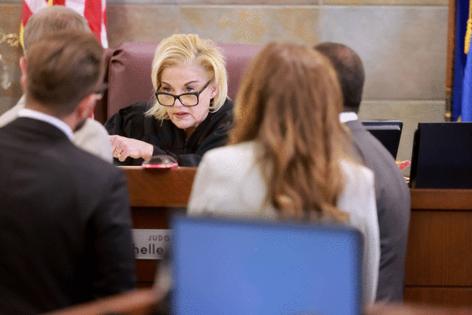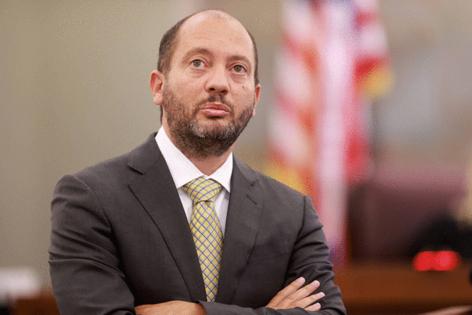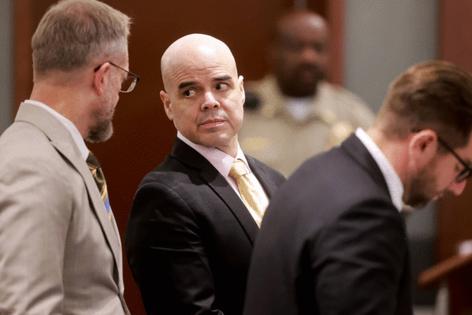Jury to resume deliberations tomorrow in murder trial over Las Vegas reporter's killing
Published in News & Features
LAS VEGAS — Jurors deliberated for more than four hours Monday without reaching a verdict in the murder trial of former Clark County Public Administrator Robert Telles, accused of killing Las Vegas Review-Journal investigative reporter Jeff German.
The panel of seven women and five men is expected to resume deliberations at 9 a.m. Tuesday. At one point, they asked one question to the court about how to zoom in on surveillance footage in evidence.
Prosecutors have asked the jury to find Telles guilty of first-degree murder with a deadly weapon against a victim 60 or older. Telles is accused of killing German in September 2022 over articles the journalist wrote about Telles’ conduct as the Clark County public administrator.
In closing arguments, Telles’ defense attorney, Robert Draskovich, emphasized a need for jurors to find proof beyond a reasonable doubt in order to convict Telles; meanwhile prosecutors pointed to the various pieces of evidence against Telles and attempted to poke holes in his claims that he was framed for German’s murder by officials and a disgruntled real estate company.
Chief Deputy District Attorney Christopher Hamner played a video clip at the end of his closing arguments, showing part of an interview Telles gave German before the journalist’s initial article in May 2022.
“People cannot just get to do whatever they want,” Telles said in the interview.
“For once, the state of Nevada is in agreement with Mr. Telles: he doesn’t get to do whatever he wants,” Hamner told the jury.
Prosecutors have accused Telles of “lying in wait” for German outside the reporter’s home on Sept. 2, 2022, while wearing a large straw hat and an orange reflective vest. Neighborhood video surveillance captured a distant image of the assailant confronting German on the side of the journalist’s house.
Chief Deputy District Attorney Pamela Weckerly gave the jury an overview of the evidence in the state’s first round of closing arguments. After Telles lost reelection, he was informed that German had submitted an additional public records request about him. In the following weeks, Telles’ phone showed evidence of accessing images of German’s home, as seen on Google maps, and his work computer accessed information about German’s address and vehicle, Weckerly said.
Surveillance footage showing the assailant’s clothing matched items found in his home. A vehicle matching the appearance of Telles’ maroon Yukon Denali was captured leaving Telles’ neighborhood, driving around German’s neighborhood, and then driving back towards Telles’ home, Weckerly said.
Telles’ DNA was found underneath German’s fingernails, Weckerly said. She argued that Telles intentionally left his phone at home, which only received incoming messages during the time frame of German’s killing.
“How could anybody but Mr. Telles be the killer?” Weckerly said. “No one would have that level of assurance, because if any of those calls had been answered from his house, it would be clear that he wasn’t the one involved.”
Throughout the trial, Draskovich painted Telles as a public official who was trying to expose corruption within the public administrator’s office.
In his closing argument, Draskovich asked jurors to consider what evidence is lacking. He said Telles’ blood was not at the crime scene, German’s blood wasn’t on any items in Telles’ home, and the murder weapon was never found.
As Draskovich paced the courtroom, he repeated arguments that Metropolitan Police Department detective Derek Jappe “inserted” himself into the homicide investigation, telling the lead homicide detective that Telles had motive to kill German. Jappe was in charge of an investigation into an alleged housing kickback scheme that Telles reported to authorities.
Draskovich also attacked surveillance footage presented by officials as the assailant’s vehicle, driving through German’s neighborhood before the killing. He zoomed in on two of the videos, showing the jury a dark silhouette of the driver.
Draskovich argued it appeared that the driver had hair.
“Does that profile match the profile in that vehicle?” Draskovich asked, gesturing towards Telles. “I mean it’s no secret, the man’s bald.”
Draskovich asked jurors to consider all the evidence when prosecutors made their closing argument.
“I’m going to ask you, with your open minds and your attentiveness, to address those concerns and at the close of this process, you find Mr. Telles not guilty,” Draskovich said.
Testimony concluded on Friday, after prosecutors called 28 witnesses and Draskovich called six witnesses, including Telles himself. Telles gave a narrative testimony to the jury, without being interrupted by his attorney, before facing questions from prosecutors.
He alleged that he was investigating independent administrators in probate cases regarding property of people who died in Clark County. He alleged that homes were being flipped for profit, without benefiting the families of the deceased, and that he was “fighting” Compass Realty & Management over the sales.
“Somebody framed me for this, and I believe it’s Compass Realty,” Telles said. “And I believe it’s for the work that I’ve done against them.”
The company has called his accusation “unconscionable and irresponsible.”
Jappe testified last week that he investigated both the kickback scheme reported by Telles, and accusations that Telles himself was receiving kickbacks.
The detective said he found no evidence that Telles received kickbacks, and the Clark County district attorney’s office determined there was not enough evidence for a prosecution in the alleged scheme Telles reported.
Hamner spoke to the jury last, giving the rebuttal round of closing arguments for the prosecutors. He concentrated on picking apart Telles’ assertion that he was framed for German’s killing.
Hamner questioned why so many people supposedly wanted to kill a journalist and frame Telles, when Telles was a lame-duck politician after losing the primary election.
When it came to Telles’ testimony, Hamner asked jurors to consider Telles’ behavior and facial expressions when he was shown evidence. Telles was seen shaking his head back and forth during prosecutors’ arguments on Monday.
Hamner said Telles spent his time testifying by attempting to “regale” jurors with tales of his accomplishments as public administrator. And Telles admitted to lying in an interview with German, when he told the journalist he was not having an affair with a staffer, Hamner said.
At one point, Hamner said Telles might have been the state’s “best witness.”
“Think about what his fears, motives, interests or feelings are, and the reasonableness of his statements,” Hamner said.
Prosecutors have asked the jury to determine that the killing was premeditated. Hamner argued that Telles was careful, deleting images and turning off his location services, but that he left “digital breadcrumbs” and evidence on his devices.
Hamner said that the explanations Telles provided gives jurors “a window into what’s in his mind.”
“That is how important Mr. Telles’ views himself,” Hamner said. “That every single one of these people, every single one of these entities, were literally willing to kill another human being who is not him, just to frame him.”
_____
©2024 Las Vegas Review-Journal. Visit reviewjournal.com.. Distributed by Tribune Content Agency, LLC.












Comments